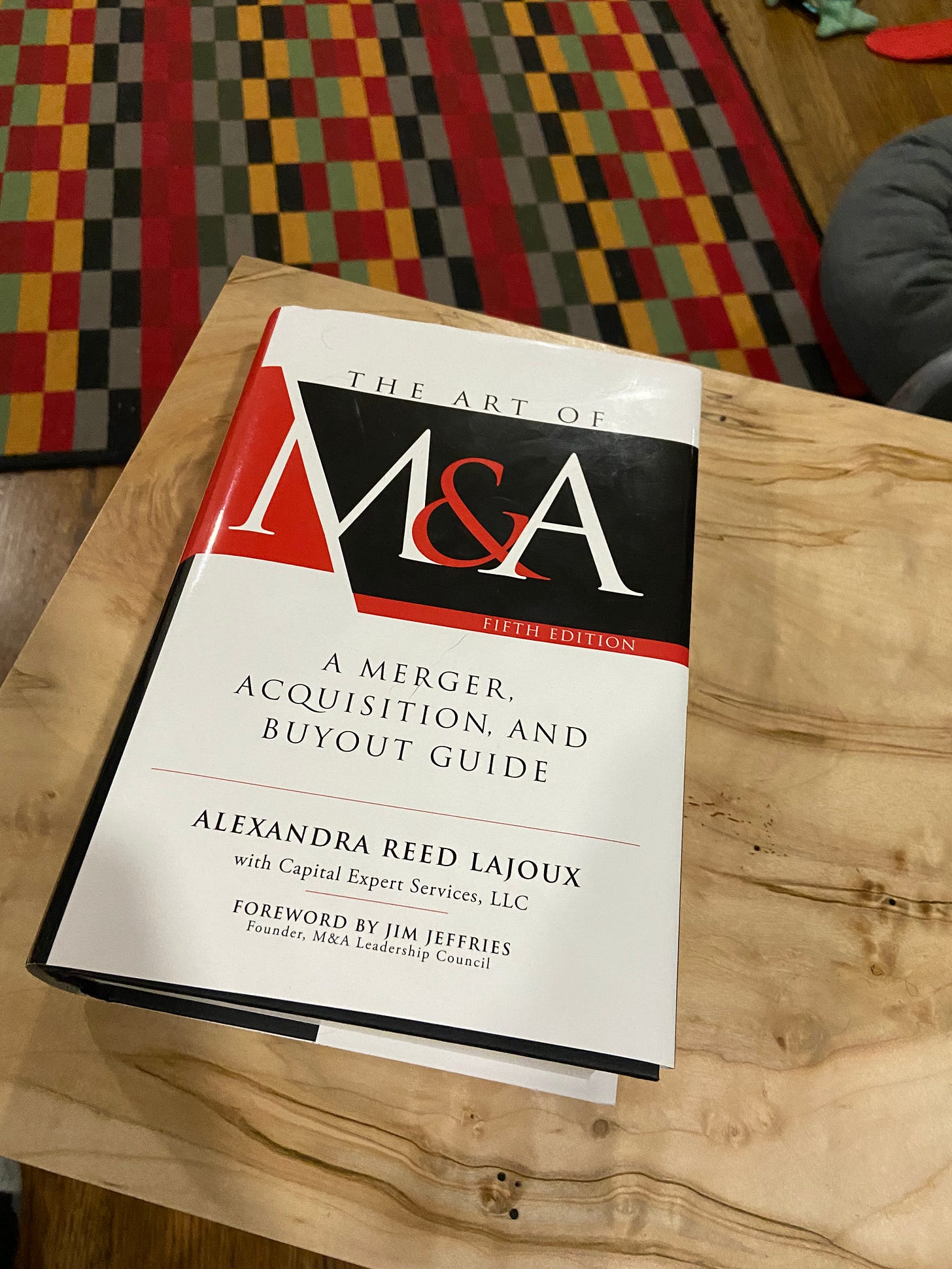I was born in 1990, with a childhood firmly in the physical age (I got my first flip phone at 15) and an adulthood immersed by internet. My childhood was spent reading longform fiction, while my early 30s have been more aptly characterized as under a constant barrage of byte-sized tidbits of attention-seeking clickbait. It's the unceasing tidal wave of shiny objects promising that the secret to all your problems is just a "Read More" away on a WordPress blog spun up 9 months ago (or even better, 4 tweets deep on a Twitter thread). Appropriately named the "attention economy," profit is derived based on the number and "quality" of eyeballs attracted to these floodwaters at a given time.
Best of all? 99.9% of the time, this content is entirely free to consume. Consumption is ironic in this setting, since, of course, we are not the consumer, but rather the consumed. Which is why I decided to buy a $100 mergers and acquisitions hardback textbook.
The Art of M&A is as dense a book as it comes. It is a step-by-step playbook for how to consider, evaluate, finance, purchase, and integrate a small business purchase as an outside investor or strategic buyer. As I get further into my legal career (with the attendant increase in income) I've become increasingly interested in finding interesting ways to invest both time and money in ventures outside of the legal world. If mergers and acquisitions put you to sleep, I get it, but hang tight with me for another few minutes.
Do you find yourself getting to the end of an 8 tweet thread, wondering why you clicked on it in the first place, and knowing beyond a doubt that you did not learn anything with enough substance to apply to a single aspect of your life? If the somewhat humorous (and often self-depreciating) tweets are any clue, I'd say this is a common refrain.
Twitter, and social media as a whole, are entropy machines. They're designed to give your brain just enough stimulation to continue the doom-scroll, but insufficient knowledge and tactical substance to actually push forward towards any perceivable goals.
Trying to accomplish new goals would likely include closing Twitter, so the social media gods-that-be don't want you to be quite that engaged and encouraged.
While not intrinsically evil, for most users this brain-draining social media experience will not be a net positive. I find the static in my brain grows increasingly louder the longer I spend idly swapping between various Chrome tabs (Reddit and Twitter, mostly). A dense textbook is the perfect solution for the chaos of overstimulation.
My goals become more concrete once I can crystalize a path towards achieving the goals. The crystals must sink in more than surface-level deep. The structure of a good textbook forces introspection, and slows the mind enough to actually forward-face, rather than mindlessly skitter off to the next "Here's how you can make $1,000 a day with AI" YouTube video. The logical structure of these books still the waters enough for mother nature to take care of the rest.
A physical textbook also has the secondary characteristics of simply not being attached to the internet. It is a self-contained creature, with the full extent of its secrets embedded into a single bound form. No more Wikipedia surfing off into the sunset (until you realize you're looking at a biography of a British noble from the 1100s), no more incessant dings from Outlook, which you just realized you forgot to close.
It also helps to read on the opposite side of the house, to further reduce the temptations that are close at hand.
What I've discovered is that after five to ten minutes, I can perceptively find my mind beginning to slow down, and to quiet. The density of an engaging textbook in a topic I'm interested in learning about forces a certain clarity of concentration. The static begins to fade, and I begin to regain that clarity of purpose that I so easily found as a teenager blowing through a new fantasy novel every week.
There is also a certain buy-in that accompanies the purchase of an expensive book. It's the same concept that pushes people into prepaying for a year at the gym on January 2nd, or into signing up with a personal trainer. The financial buy-in can be the last nudge necessary to get off the entropy whirligig.
If I find something actionable in the textbook, it will be secondary to the simple enjoyment of a focused activity. Some people find this same narrowing of the mind (the preverbal horse blinders) through extreme sports or woodworking or crafting or some other hands-on activity. If one of those activities achieves the same contentment for you, then go with what works for you.
This is simply a love letter to good, clear, and engaging writing. Perhaps it was even a bit of a push to beginning to write myself again outside of my usual legal briefs and emails. If there's something you've been meaning to learn, do yourself a favor and just grab the best textbook you can find on the subject, and dive into the book in a quiet corner of your house. I think you'll find it an enjoyable experience.
May your minds be less clouded by static than usual.





